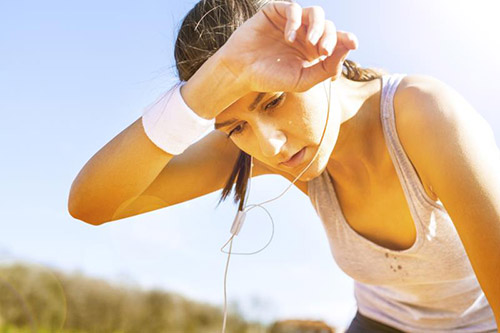
Hydration: In the heat and humidity of our tropical climate, it is very important to begin an event or training session well hydrated and have a plan to stay well hydrated throughout. Decreases in mental function will affect your judgement and lead to poorer performances.
Facts About Dehydration:
- As dehydration increases, there is a gradual reduction in physical and mental performance. There is an increase in heart rate and body temperature, and an increased perception of how hard the exercise feels, especially when exercising in the heat.
- Studies show that loss of fluid equal to 2% of body mass is sufficient to cause a significant decrease in performance (that’s a 1.4 kg loss in a 70 kg athlete).
- Dehydration of greater than 2% loss of body weight increases the risk of nausea, vomiting, diarrhea and other gastro-intestinal problems during exercise.
- Dehydration reduces the rate of fluid absorption from the intestines, making it more difficult to reverse the fluid deficit. You may end up feeling bloated and sick if you delay fluid replacement.
- It is impossible to ‘train’ or ‘toughen’ your body to handle dehydration. Don’t bother trying!
Hydration Guidelines Summary
Dehydration impairs performance and mental skills, especially in hot weather.
- Monitor your typical sweat losses during exercise and develop a hydration plan for before, during and after exercise that replaces these losses.
- Aim to have minimal weight (fluid) loss during exercise, preferably less than 1kg.
- During exercise, drink at a rate that is comfortable and practical to replace most of your sweat losses.
- Do not drink at a rate that exceeds sweat losses.
- Be aware of greater fluid losses in hot and humid environments.
- Water is an excellent fluid for low intensity and short duration sports.
- Sports drinks are ideally suited to high intensity and endurance sports.
- Tea and coffee are helpful in replacing lost fluids
- Drink alcohol sensibly

Hydration Plan (Needs to be practiced well prior to Season to prevent gastro intestinal upset!!)
- 1. Stay in a well hydrated state always by drinking 2L + of fluids per day
- 2. Start Early and Often pre-event, prime the stomach with around 5ml/kg body wt ~ 300-500ml just before the event.
- 3. Aim to consume 250ml of fluids every 20 minutes during exercise to offset fluid loss.
- 4. Don’t wait until your thirsty, if you feel thirsty then you are already too dehydrated to perform at your best
- 5. Post Event consume 150%of wt deficit within the 2 hours post game
Preparation and Recovery Nutrition
Eating well before your event and in the days prior will have a big effect on your performance. To perform at your best it is important to start the event in optimal hydrated and fuelled state. It should not be necessary to eat solid food during a game that lasts under 90 min if you’re in a well fed state. If you fatigue early in the event you probably haven’t: Eaten enough Carbohydrate (CHO) beforehand; taken enough sport drink; trained enough; or have overtrained!!
The following Information table will help you fine tune your nutrition intake to fuel your games and maximise recovery so you can train effectively.
Nutrition Plan (Needs to be practiced well prior to Season to prevent gastro intestinal upset!!)
THE DAY BEFORE
Eating a meal rich in carbohydrate (pastas, bread, rice, potato) during the night previous to the event can help load CHO stores, this is especially effective if the event is early the next morning and a smaller pre event meal can only be eaten.
THE PRE-EVENT MEAL (1-4HOURS PRE-EVENT)
- Consume around 1-4g CHO/kg BW, 1-4hours before, (70-200g CHO)
- Experiment to find the critical time before excise that CHO intake should be avoided.
- Choose low glycaemic (GI) CHO-rich intake in the pre event menu
- Include some high-intensity sprints during the warm up to stimulate hepatic glucose output
Suggestions:
- Plain Breakfast cereal with low-fat milk and fruit
- Pancakes/pikelets with maple syrup
- Toast, muffins, or crumpets with honey/jam/syrup
- Baked beans on toast
- Creamed rice and tinned fruit
- Spaghetti with low fat tomato-based sauce
- Roll or Sandwich with banana and honey
DURING THE GAME
- Consume around 30-60g CHO per hour of exercise, this equates to around this equate to about 250ml of sport drink every 15minutes (use breaks and opportunities in the game to get this!)
- Stay well hydrated (See Hydration fact sheet)
POST GAME
There is a 2hr opportunity post-exercise where your body will recover glycogen stores quickly if adequate CHO are ingested, this will aid you recovery
- Try to eat 1-2g CHO/kg BW, in the two hours post-exercise, this equates to around 70-150g.
- Ingesting around 10g of Protein also aids this recovery post exercise
Suggestions
- Baked beans on Toast
- Breakfast cereal and milk
- 200g low fat yoghurt + ¼ cup dried fruit
- Steamed rice and stir fired vegetables
- Smoothies made on milk/yoghurt with fresh fruit
If you found this article interesting you may also enjoy reading Endurance Training – Preparing For Endurance Events, Endurance Training Jargon, or Nutrition – The Secret Behind The Perfect Body Composition.
References:
Sport Dietitians Australia (SDA) Fact Sheet 1 and 11 http://www.sportdeititians.com.au
Burke and Deakin (2000) Clinical Sports Nurtrition 2nd ed. Sydney, McGraw Hill
